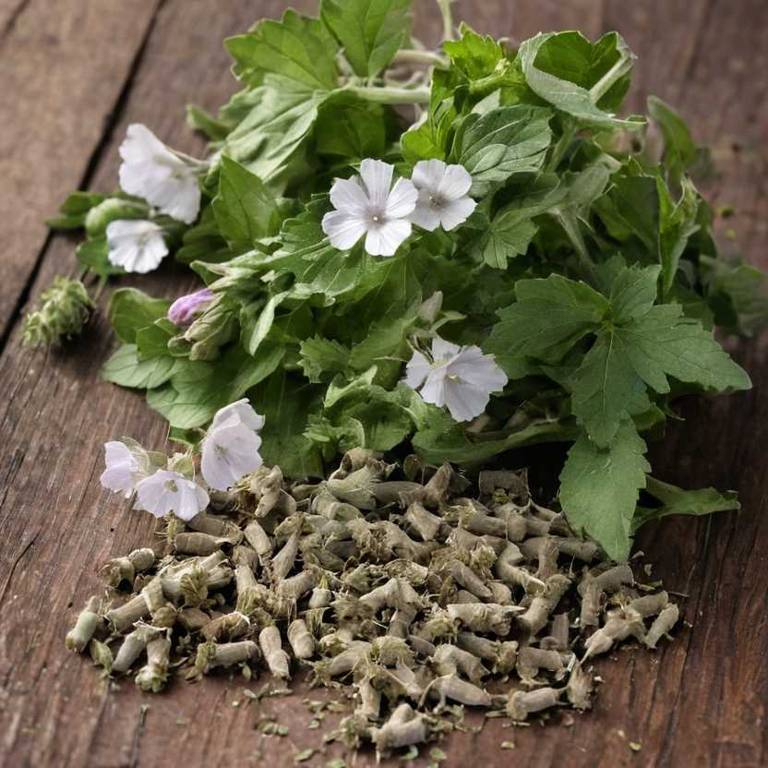By Leen Randell
Updated: Jul 05, 2024
What Are The Medicinal Properties Of Althaea Officinalis (Marshmallow)?

Althaea officinalis, also known as marshmallow, has health benefits such as soothing inflamed tissues and reducing fever.
Its medicinal constituents include mucilages, flavonoids, and phenolic acids, which have anti-inflammatory and antioxidant properties. The herb is commonly used in medicinal preparations such as teas, tinctures, and poultices. Possible side effects may include allergic reactions or interactions with certain medications.
When using marshmallow, it is recommended to consult a healthcare professional, especially for individuals with pre-existing medical conditions or taking prescription medications.
This article explains the health benefits, active constituents, medicinal preparations, possible side effects, and precautions related to Althaea officinalis.
- What are the health benefits of Althaea officinalis?
- What are the active constituents of Althaea officinalis?
- What are the medicinal preparations of Althaea officinalis?
- What are the possible side effect of using Althaea officinalis improperly?
- What precautions to take when using Althaea officinalis medicinally?
What are the health benefits of Althaea officinalis?
Althaea officinalis, also known as marshmallow, has health benefits such as soothing digestive issues, reducing inflammation, and calming skin irritations.
Its anti-inflammatory properties make it effective in treating conditions like irritable bowel syndrome (IBS) and gastrointestinal ulcers.
The plant's mucilaginous properties also make it an effective treatment for burns, wounds, and skin conditions such as eczema and dermatitis, promoting wound healing and tissue repair.
Here's a detailed article about the 10 health benefits of Althaea officinalis.
What are the active constituents of Althaea officinalis?
Althaea officinalis, also known as marshmallow, has active constituents such as mucilages, flavonoids, and triterpenoids.
The mucilages, primarily composed of galactomannans and polysaccharides, have been shown to exhibit anti-inflammatory and soothing properties, making it a popular ingredient in topical creams and ointments.
Flavonoids and triterpenoids have been reported to possess antioxidant and anti-inflammatory activities, further contributing to its medicinal value.
Here's a detailed article about the 10 active constituents of Althaea officinalis.
What are the medicinal preparations of Althaea officinalis?
Althaea officinalis, also known as marshmallow, has medicinal preparations such as root infusions, decoctions, and extracts.
These are used to treat digestive issues, inflammation, and skin conditions. The plant's mucilage, a gel-like substance, is particularly beneficial for soothing irritated mucous membranes and reducing inflammation in the digestive tract.
Althaea officinalis preparations are also used externally to calm skin irritations and promote wound healing.
Here's a detailed article about the 10 medicinal preparations of Althaea officinalis.
What are the possible side effect of using Althaea officinalis improperly?
Improper use of Althaea officinalis, also known as marshmallow, increases the chances of experiencing side effects such as digestive issues, nausea, and diarrhea due to its mucilaginous properties.
In rare cases, allergic reactions may occur, resulting in skin rashes, itching, and swelling. Consuming excessive amounts can also lead to interactions with certain medications, potentially exacerbating underlying health conditions.
It is essential to consult a healthcare professional for proper guidance on using this herb.
Here's a detailed article about the 10 most common side effects of Althaea officinalis.
What precautions to take when using Althaea officinalis medicinally?
Before using Althaea officinalis, also known as marshmallow, for medicinal purposes, you must take precautions such as consulting with a healthcare professional, especially if you have allergies or are pregnant or breastfeeding.
The root and leaves of the plant may cause allergic reactions, interact with medications, or worsen certain health conditions.
Start with a small dose to test tolerance and monitor for side effects, and use only high-quality, organic products to minimize risk of contamination or adulteration.
Here's a detailed article about 10 precautions to take when using Althaea officinalis.